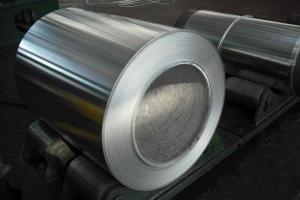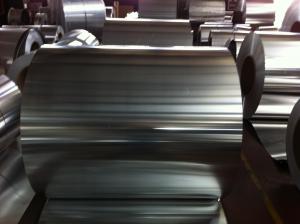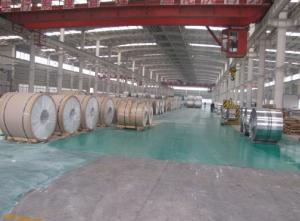Continuous Casting Aluminium Coils for Building AA1050
- Loading Port:
- China Main Port
- Payment Terms:
- TT or LC
- Min Order Qty:
- -
- Supply Capability:
- -
OKorder Service Pledge
OKorder Financial Service
You Might Also Like
1.Structure of Product Description
Continuous Casting Aluminium Coils are one semi-finished aluminium material. This strip can be rolled down to aluminium coil,sheet,circle ect. The alloy AA1050 is widly used in building, industry ect. Its weight is much lower than steel. So many customers choosed aluminium material instead of steel. Moreover, the aluminium will not have rust, compared with steel products.
2. Main features of the product
a.Competitive price---We have our own mills and can produce mill finished aluminium coils, so we can control the production cost better.
b.Professional after-sale service---We have more than 15 years exportation experience and you need not worry about the exporation problems.
c.Fast delivery time---We can control the delivery time within 35 days.
3. Image
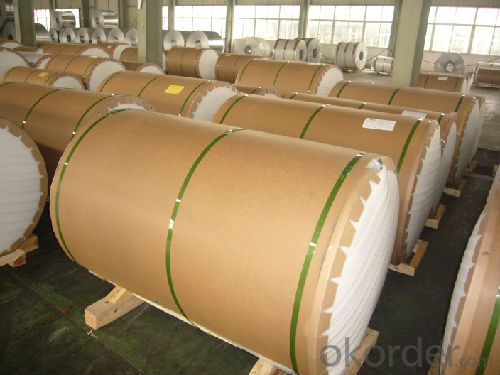
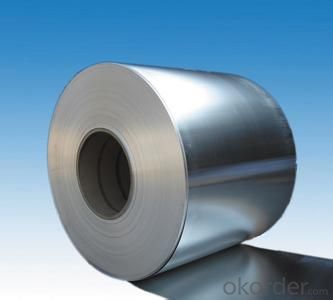
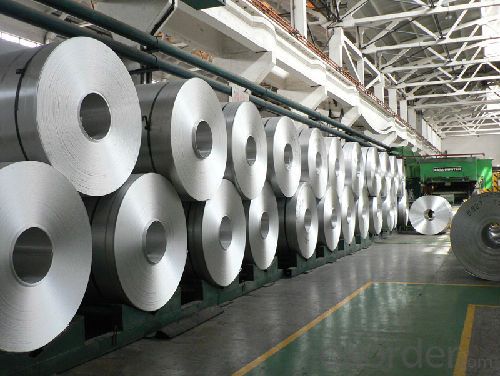
4.Products Specification
| Alloy | Temper | Thickness | Coil ID | Coil Weight |
| AA1050 | F | 3mm-5mm | 610mm+/-10mm | 5-6 tons |
5. FAQ:
What is the quality standard?
---Usually our standard is GB3880-2006
What is the largest width?
---It is 2300mm
What is the MOQ?
---Usually we can accept 80 tons.
- Q:Can aluminum coils be used for food processing conveyor systems?
- Aluminum coils are a viable option for food processing conveyor systems. The food processing industry favors aluminum for its advantageous properties. To begin with, aluminum's lightweight nature facilitates effortless installation and transport. This aspect proves especially valuable for conveyor systems that necessitate frequent reconfiguration or relocation. Moreover, aluminum exhibits exceptional resistance to corrosion, a pivotal attribute in food processing environments where exposure to moisture, chemicals, and food particles is prevalent. Additionally, aluminum's hygienic attributes make it easy to clean and maintain, ensuring adherence to food safety standards. Lastly, aluminum coils can be effortlessly molded and customized to meet the specific requirements of conveyor systems, thereby facilitating efficient and effective food processing operations. Consequently, aluminum coils emerge as a fitting choice for food processing conveyor systems.
- Q:How do aluminum coils compare to zinc coils in terms of durability?
- The durability of aluminum coils and zinc coils is influenced by their different properties. Aluminum coils are highly durable due to their excellent corrosion resistance. They naturally develop an oxide layer that acts as a protective barrier against rust and degradation. This makes them ideal for use in coastal areas or locations with high humidity levels. In contrast, zinc coils, specifically galvanized steel coils, are coated with a layer of zinc to enhance their corrosion resistance. The zinc coating acts as a sacrificial layer, corroding first and protecting the underlying steel from rust. As a result, zinc coils are also highly durable and can withstand harsh conditions where the steel substrate is exposed to moisture or chemicals. Although both aluminum and zinc coils offer good durability, aluminum coils have an advantage in terms of corrosion resistance. Their natural oxide layer provides continuous protection, while zinc coils rely on the sacrificial zinc coating, which can gradually wear off over time. However, the overall durability of both types of coils depends on factors such as maintenance, usage, and the specific environment in which they are installed.
- Q:Are aluminum coils suitable for electrical conductors?
- Yes, aluminum coils are suitable for electrical conductors. Aluminum is a widely used material in the electrical industry due to its excellent electrical conductivity. It has around 61% conductivity of copper, which is the most commonly used metal for electrical conductors. Aluminum coils are lightweight, cost-effective, and have good thermal conductivity, making them a popular choice for various electrical applications. However, it is important to note that aluminum has a lower tensile strength compared to copper, so it may require a larger cross-sectional area to achieve the same level of current carrying capacity. Additionally, proper insulation and connectors are necessary to prevent oxidation and ensure efficient electrical conductivity in aluminum coils.
- Q:What is the role of aluminum coils in the transportation industry?
- Due to their numerous advantageous properties, aluminum coils play a crucial role in the transportation industry. One of their primary uses is in manufacturing transportation vehicles, including cars, trucks, trains, and airplanes. Aluminum, being a lightweight material with a significantly lower density than steel, is an ideal choice for enhancing fuel efficiency and reducing weight in transportation systems. The use of aluminum coils in transportation vehicles offers several benefits. Firstly, their lightweight nature helps increase fuel efficiency by reducing the energy required for movement. This results in lower fuel consumption, reduced greenhouse gas emissions, and cost savings for transportation companies. Additionally, aluminum coils possess excellent corrosion resistance properties, enabling transportation vehicles to withstand harsh weather conditions such as rain, snow, and exposure to salt. This durability is particularly important for vehicles operating in coastal or snowy areas. The resistance to corrosion also extends the lifespan of the vehicles, reducing maintenance costs. Furthermore, aluminum coils have a high strength-to-weight ratio, making them a reliable choice for structural components in transportation vehicles. This strength allows manufacturers to design lighter and more efficient vehicles without compromising safety or durability. Moreover, the use of aluminum coils contributes to the sustainability efforts of the transportation industry. Aluminum is highly recyclable, and the recycling process requires significantly less energy compared to its initial production. By utilizing aluminum coils in transportation vehicles, the industry can minimize its environmental impact and reduce reliance on non-renewable resources. In conclusion, aluminum coils play a pivotal role in the transportation industry by enhancing fuel efficiency, providing corrosion resistance, enabling lightweight design, offering structural strength, and promoting sustainability. Their use in manufacturing transportation vehicles leads to cost savings, reduced emissions, improved durability, and enhanced overall efficiency in the transportation sector.
- Q:How are aluminum coils protected against corrosion?
- Aluminum coils are protected against corrosion through various methods. One common method is the application of a protective coating or finish on the surface of the coil. This coating acts as a barrier, preventing the contact of the aluminum surface with moisture, oxygen, and other corrosive elements present in the environment. The coating can be a layer of paint, anodizing, or a specialized protective film. Another method used for protecting aluminum coils against corrosion is the process of alloying. By adding small amounts of other metals such as copper or zinc to the aluminum, it enhances the corrosion resistance of the alloy. These alloyed metals create a protective oxide layer on the surface of the aluminum, which acts as a shield against corrosion. In addition to coatings and alloying, proper cleaning and maintenance of aluminum coils are crucial for preventing corrosion. Regular cleaning helps remove any contaminants or corrosive substances that may have accumulated on the surface of the coils. This ensures that the protective coatings or oxide layers remain intact and effective in preventing corrosion. Furthermore, proper installation and sealing of aluminum coils are essential to protect them against corrosion. Effective sealing prevents moisture or other corrosive agents from entering the coil's interior, which can lead to corrosion over time. Overall, a combination of protective coatings, alloying, regular cleaning, and proper installation techniques play a vital role in safeguarding aluminum coils against corrosion, ensuring their longevity and optimal performance.
- Q:Are aluminum coils suitable for architectural roofing?
- Yes, aluminum coils are suitable for architectural roofing. Aluminum is a lightweight and durable material that offers excellent corrosion resistance and longevity. It is also highly malleable, allowing for flexibility in design and installation. Additionally, aluminum coils can be easily formed into various profiles and shapes, making them ideal for architectural roofing applications.
- Q:I want to make arrows for my bow that making, i have an idea of making a wooden mold and then finding the melting point of aluminum foil and melt it, prob is that i dont have anything to melt it with my moms oven goes up to only 500F and i need one up to 1240F
- It sounds like you could be re-inventing the wheel here. You know you can buy aluminium rod and tube from Ebay suppliers? It would be a lot easier to make some arrows from that. If you are looking for a light and strong material, look at carbon fibre rod available from model aircraft suppliers. It's a beautiful material, unbelievably strong. I think it would make great hi-tech arrows, and it doesn't bend like aluminium.
- Q:What is the shelf life of aluminum coils?
- The shelf life of aluminum coils may differ based on a variety of factors, such as storage conditions, handling, and the specific alloy employed. Provided they are stored correctly, aluminum coils can generally remain usable for several years. To maintain their longevity, it is advisable to store them in a dry and clean environment, keeping them away from moisture, extreme temperatures, and corrosive substances. Moreover, one should handle them with caution to avoid any harm or contamination that might decrease their shelf life. It is also crucial to carry out regular inspections and maintenance to ensure the integrity and endurance of the aluminum coils. Ultimately, for more accurate information regarding the specific shelf life of aluminum coils, it is recommended to refer to the manufacturer's guidelines or consult a professional in the industry.
- Q:How exactly can you tell (just by looking) that the nipple used to tighten a spoke is brass and not aluminum? I know some are silver - not sure if they are painted silver or what. But without scraping or causing any damage to the nipple, how would one know for sure if they have no experience between the two.p.s. I don't know how heavy or light either is, so if that is one way to tel, it's not a good way for me.
- Commercially pure aluminum has a tensile strength of approximately 90MPa and can be improved to around 180MPa by cold working. Typical Brass alloys have tensile strengths in the range 250 - 500MPa. There maybe different brass materials which exceed this limit. There may be those which are lower in tensile strength than the minimum of this range. Check in the web. But, according to these data, you can see that Brass is stronger than Aluminum. So, the brass plate is stronger than the Al plate. However, Aluminum is a pure metal. Brass is an alloy. So, there maybe different brasses depending on their composition.
- Q:Can aluminum coils be used for electrical conductivity purposes?
- Using aluminum coils for electrical conductivity purposes is not possible. Although aluminum is a decent conductor of electricity, it is not appropriate for coils that are specifically intended for electrical conductivity. Aluminum has a higher resistance in comparison to materials like copper or silver, which are frequently used for electrical conductivity purposes. Furthermore, aluminum has a lower melting point than copper, therefore utilizing it in coils for high electrical currents can result in overheating problems. Consequently, it is more typical to use materials such as copper or silver for electrical conductivity purposes, particularly in situations where high conductivity and low resistance are necessary.
1. Manufacturer Overview |
|
|---|---|
| Location | |
| Year Established | |
| Annual Output Value | |
| Main Markets | |
| Company Certifications | |
2. Manufacturer Certificates |
|
|---|---|
| a) Certification Name | |
| Range | |
| Reference | |
| Validity Period | |
3. Manufacturer Capability |
|
|---|---|
| a)Trade Capacity | |
| Nearest Port | |
| Export Percentage | |
| No.of Employees in Trade Department | |
| Language Spoken: | |
| b)Factory Information | |
| Factory Size: | |
| No. of Production Lines | |
| Contract Manufacturing | |
| Product Price Range | |
Send your message to us
Continuous Casting Aluminium Coils for Building AA1050
- Loading Port:
- China Main Port
- Payment Terms:
- TT or LC
- Min Order Qty:
- -
- Supply Capability:
- -
OKorder Service Pledge
OKorder Financial Service
Similar products
New products
Hot products
Related keywords
